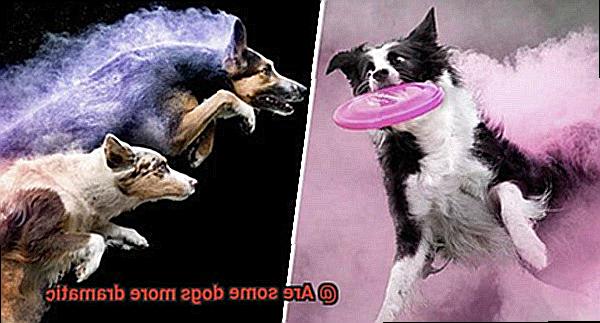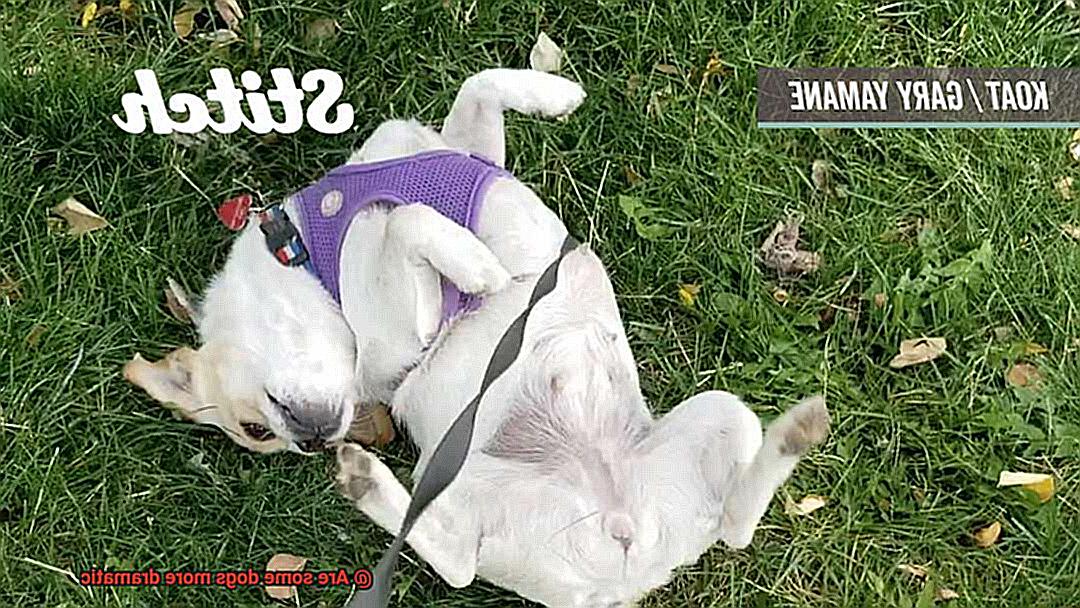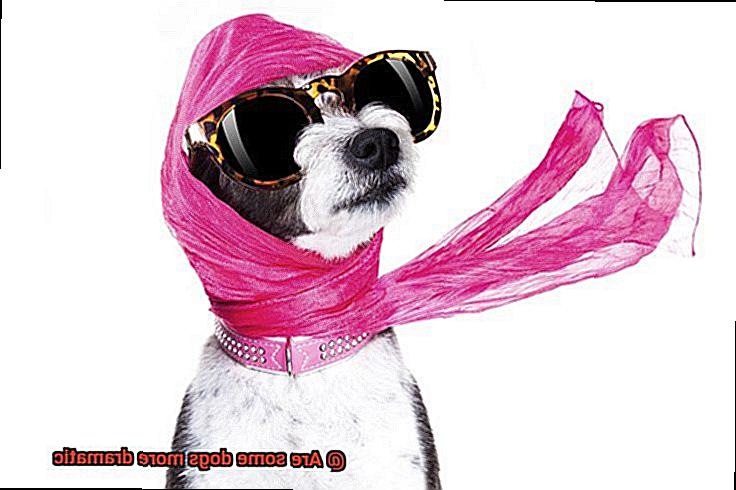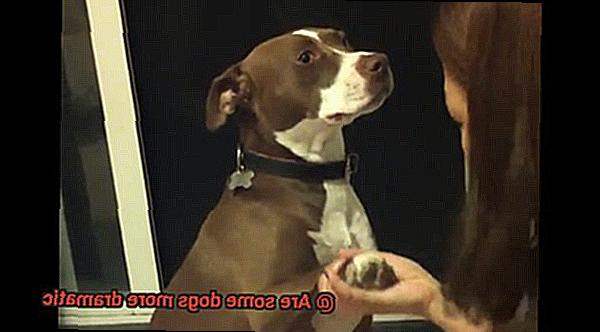Are some dogs more dramatic?
Title: Unraveling the Canine Drama King and Queen Phenomenon: Are Some Dogs Just Born to Be Dramatic?
Introduction:
Contents
- 1 What is Dramatic Behavior in Dogs?
- 2 Factors Influencing Dramatic Behavior in Dogs
- 3 Common Signs of Dramatic Behavior in Dogs
- 4 Benefits of Understanding and Managing Dramatic Behaviors
- 5 Training Techniques for Managing Dramatic Behaviors
- 6 Mental and Physical Stimulation to Help Redirect Energy
- 7 Professional Assistance for Struggling Owners
- 8 Conclusion
Step right up, dog lovers. Get ready to witness the captivating world of canine drama unfold before your very eyes. We’ve all seen those dogs who could give Hollywood actors a run for their money with their over-the-top gestures, dramatic sighs, and soul-piercing gazes. But have you ever wondered if some dogs are simply born with a natural flair for the dramatic?
In this riveting exploration, we’ll delve deep into the realm of canine theatrics and uncover what makes certain dogs stand out as true drama kings and queens. Join us on this journey as we unravel the mysteries behind their exaggerated behavior and discover why some pups were destined for the spotlight.
Why Do Some Dogs Crave the Drama?
Just like humans, our furry companions possess unique personalities that are shaped by a variety of factors, including genetics, environment, and life experiences. These elements can greatly influence how they express their emotions, leading to some dogs showcasing more dramatic behavior than others.
Take, for instance, the legendary Chihuahua. Despite their tiny stature, these pint-sized powerhouses are renowned for their larger-than-life personalities. With an arsenal of exaggerated whimpering, high-pitched shrills, and theatrical displays of stubbornness at their disposal, Chihuahuas know exactly how to captivate an audience.
But let’s not forget about the Basset Hound – those droopy-eyed darlings who could give Shakespearean actors a run for their money. With every melancholic expression and deep sigh they emit during even the simplest tasks like going for a walk, Basset Hounds effortlessly embrace the role of drama royalty.
However, it’s important to note that breed alone doesn’t determine a dog’s dramatic nature. Within any breed, individual personalities can vary greatly. Even within a litter, you might find one puppy who craves the spotlight, while another prefers to observe the world from the sidelines.

What is Dramatic Behavior in Dogs?
French Bulldogs, known for their charming personalities and squishy faces, have gained immense popularity as beloved pets. However, alongside their endearing nature, these dogs may exhibit what appears to be dramatic behavior.
In this comprehensive article, we will explore the concept of dramatic behavior in dogs, with a specific focus on French Bulldogs. By delving into the potential causes and effective management techniques, we aim to help you establish a harmonious relationship with your furry companion.
Defining Dramatic Behavior:
Dramatic behavior in dogs refers to exaggerated or attention-seeking actions displayed by our canine friends. These behaviors are often intense, seeking immediate attention or reaction from their owners or those around them. Examples include excessive barking, whining, jumping, or even throwing tantrums.
Factors Influencing Dramatic Behavior:

- Temperament and Personality: Like humans, each dog possesses a unique temperament that can influence the likelihood of dramatic behavior. French Bulldogs, with their playful and attention-seeking nature, may sometimes be misunderstood as displaying dramatic behavior.
- Genetics and Past Experiences: Certain dogs may be more predisposed to dramatic behavior due to genetic factors or past experiences. Rescue dogs that have endured trauma or neglect may exhibit more dramatic behaviors as a result.
Addressing Dramatic Behavior:
- Understanding the Reasons: Dramatic behavior in dogs can stem from underlying anxiety or fear. Identifying the root cause is crucial in managing it effectively.
- Training and Socialization: Proper training establishes boundaries and teaches dogs appropriate ways to seek attention or express their needs. Socialization exposes them to different situations, reducing the likelihood of dramatic behavior.
- Mental and Physical Stimulation: Providing adequate mental and physical stimulation through activities like obedience training, puzzle toys, and regular exercise can redirect a dog’s energy and minimize dramatic behaviors.
- Seeking Professional Help: If you’re struggling to manage your French Bulldog’s dramatic behaviors, consider consulting a professional trainer or behaviorist who can provide personalized guidance.
Factors Influencing Dramatic Behavior in Dogs
Prepare to enter the captivating world of dramatic behavior in dogs. Canines have a flair for the dramatic that can leave owners puzzled and seeking answers. In this article, we will explore the various factors that influence dramatic behavior in dogs, providing insightful understanding and effective management techniques.
Breed Predisposition:
Certain dog breeds are more prone to dramatic behavior than others. For example, French Bulldogs, known for their playful and attention-seeking nature, may exhibit more dramatic behavior compared to calmer breeds. Understanding breed characteristics is crucial in deciphering dramatic behavior.
Environmental Factors:
The environment plays a significant role in shaping a dog’s behavior. Inconsistent routines, lack of socialization, and insufficient mental stimulation can lead to attention-seeking behaviors or expressions of frustration. Creating a stable and enriching environment minimizes dramatic tendencies.
Socialization and Training:
Proper socialization and training from an early age are vital for dogs to develop well-rounded personalities. Lack of exposure to different people, animals, and environments can result in fear or anxiety, leading to exaggerated reactions. Investing time in socializing dogs reduces dramatic behavior.

Previous Experiences:

Negative or traumatic experiences greatly influence a dog’s level of dramatic behavior. Dogs that have been mistreated may exhibit excessive barking or aggression when faced with similar triggers. Understanding past experiences helps provide necessary support and reassurance.
Health Issues:
Underlying health problems contribute to dramatic behavior in dogs. Pain, discomfort, or medical conditions that cause stress or anxiety manifest as excessive whining or self-destructive behaviors. Regular veterinary check-ups rule out potential health issues.
Owner’s Response:
How owners respond to their dog’s dramatic behavior can reinforce or discourage these actions. Consistent training techniques and positive reinforcement minimize and manage dramatic tendencies. Understanding consistency and patience is key.
Genetic Factors:
Genetics also play a role in a dog’s predisposition towards dramatic behavior. Breeding practices that prioritize temperament and behavior traits influence the likelihood of dramatic behavior. Research reputable breeders who prioritize healthy temperaments when selecting a dog.
Common Signs of Dramatic Behavior in Dogs
These charming and affectionate companions are known for their expressive personalities and unique antics. However, some dogs may take their dramatic flair to the next level, leaving their owners puzzled. In this article, we will explore the most common signs of dramatic behavior in dogs and provide practical solutions to manage and modify these behaviors.
Excessive Barking or Howling:
Some dogs have a natural talent for turning up the volume on their vocal cords. Even the slightest stimuli, like a doorbell or passing car, can trigger a symphony of barks or howls. This excessive vocalization often stems from a desire for attention or an attempt to communicate something. To curb this behavior, redirect their focus with engaging toys or teach them alternative ways to communicate.
Attention-Seeking Behavior:
If your dog is constantly vying for your attention, you may have a little drama queen or king on your hands. These attention-seeking behaviors can range from following you around the house to nudging you for petting or pawing at you for playtime. To address this, establish a consistent routine that includes designated playtime and quality bonding moments. This will help them feel secure and reduce their need for constant attention.
Destructive Behavior:
Drama can sometimes be destructive, especially when it comes to dogs. Chewing furniture, digging up the yard, or tearing apart pillows are all signs of frustration, anxiety, or boredom. Provide your dog with mental stimulation through interactive toys and puzzle games.
Additionally, regular exercise and training sessions will channel their energy in a positive direction.
Attention-Seeking Behaviors (Part 2):
Some dogs take their attention-seeking behavior to new heights by resorting to jumping up on people, pawing, or even nipping or biting. This behavior can be alarming and potentially dangerous if left unaddressed. Establish boundaries through consistent training and positive reinforcement techniques. Teach your dog appropriate ways to seek attention.
Separation Anxiety:
Dogs with an affectionate nature may develop separation anxiety when left alone. Dramatic dogs may exhibit excessive whining or barking, pacing, drooling, or destructive behaviors. To alleviate separation anxiety, gradually desensitize your dog to your departures by practicing short absences. Provide comforting items like a favorite toy or a cozy blanket to help them feel secure.
Fear or Aggression:

In some cases, dramatic behavior may manifest as fear or aggression towards certain stimuli or situations. Dogs may become reactive, lunging, growling, or barking aggressively. Professional training and behavior modification techniques are essential in addressing fear-based behaviors. Gradual exposure to triggers and positive reinforcement will help your dog overcome these dramatic reactions.
Benefits of Understanding and Managing Dramatic Behaviors
French Bulldogs are renowned for their adorable and expressive personalities. From playful antics to unique quirks, these lovable dogs sometimes exhibit dramatic behaviors that may leave owners scratching their heads. However, by understanding and managing these behaviors, a wealth of benefits can be unlocked, enhancing the relationship with your French Bulldog. This blog post explores the advantages of understanding and managing dramatic behaviors in French Bulldogs.
Enhanced Communication:
French Bulldogs, like all dogs, rely on communication to express their needs and emotions. By deciphering their dramatic behaviors, such as excessive barking or attention-seeking, effective communication is established. This opens up a world of understanding, allowing you to meet their needs and build a stronger bond.

Reduced Stress and Anxiety:

Dramatic behaviors in French Bulldogs can often be symptoms of stress or anxiety. By recognizing and addressing these behaviors, underlying causes of distress are alleviated. This benefits your furry friend’s well-being and creates a more peaceful home environment.
Improved Training:
Training a dog with dramatic behaviors can be challenging, but understanding their motivations allows for tailored training methods. By managing dramatic behaviors during training sessions, unwanted behaviors are prevented from being reinforced, leading to quicker results.
Better Socialization:
French Bulldogs with dramatic behaviors may struggle with social interactions. Understanding these behaviors helps navigate socialization situations effectively, ensuring your dog feels comfortable and secure. Improved social skills reduce conflicts or aggression.
Preventing Health Issues:

Some dramatic behaviors in French Bulldogs might indicate underlying health issues or discomfort. Understanding and managing these behaviors enables early detection of potential health problems, ensuring appropriate veterinary care. A proactive approach prevents progression of health issues and promotes overall well-being.
Strengthened Bond:
Investing time and effort into understanding and managing dramatic behaviors shows commitment to your French Bulldog’s well-being. This fosters trust and security, strengthening the bond between you and your furry companion. A strong bond is the foundation for a happy and fulfilling relationship.
Training Techniques for Managing Dramatic Behaviors
French Bulldogs are known for their playful and energetic nature, but sometimes their dramatic behaviors can become challenging for dog owners to handle. Excessive barking, jumping, whining, growling, or destructive behavior can disrupt the harmony in your household.
Fortunately, there are training techniques that can effectively manage these dramatic behaviors and help your French Bulldog become a well-behaved companion.
- Positive reinforcement: This technique involves rewarding desirable behaviors with treats, praise, or playtime. By reinforcing positive behaviors such as sitting calmly or playing quietly, your French Bulldog will learn that these actions lead to rewards. Consistency is key here; make sure to reward them every time they exhibit the desired behavior.
- Consistency: Establishing clear rules and boundaries and consistently enforcing them is crucial in managing dramatic behaviors. When your French Bulldog understands what is expected of them, they are less likely to resort to dramatic behaviors out of confusion or frustration.
- Redirecting attention: If your French Bulldog starts exhibiting a dramatic behavior, redirect their attention to an alternative behavior that is more appropriate and desirable. For example, if they start barking excessively, redirect their attention to a command like “sit” or “stay.” This helps shift their focus and reinforces positive behaviors.
- Desensitization and counterconditioning: These techniques involve gradually exposing your French Bulldog to triggers that typically elicit dramatic behaviors and pairing them with positive experiences. For instance, if your French Bulldog gets anxious or aggressive around strangers, introduce controlled interactions with unfamiliar people while providing treats or praise. Over time, this association will help reduce their dramatic reactions.
- Seek professional help: If your French Bulldog’s dramatic behaviors persist or are severe, it may be beneficial to consult a certified dog trainer or behaviorist. They can assess the underlying causes of the behavior and develop a customized training plan to address it effectively.
Remember, training takes time and consistency. Be patient and persistent, and adapt the techniques to suit your French Bulldog’s individual needs. With proper training and guidance, even the most dramatic French Bulldogs can become well-behaved and obedient companions.
Research has shown that dramatic behaviors in dogs can manifest in various ways, including excessive barking, jumping, whining, growling, or even destructive behavior. These behaviors can be challenging for dog owners to cope with, but with proper training techniques, they can be effectively managed.
One of the most effective methods for managing dramatic behaviors in dogs is positive reinforcement. This technique involves rewarding desirable behaviors with treats, praise, or playtime, while ignoring or redirecting undesirable behaviors. By reinforcing positive behaviors, dogs learn that certain actions lead to rewards and are more likely to repeat them.
Mental and Physical Stimulation to Help Redirect Energy

French Bulldogs are renowned for their exuberant energy and constant desire for attention. However, if left unmanaged, this energy can manifest in disruptive behaviors. This article will delve into the concept of redirecting French Bulldogs’ energy through the effective use of mental and physical stimulation, consistent training, and positive reinforcement techniques.
Mental Stimulation:
- Engage problem-solving skills: Equip your French Bulldog with interactive toys and puzzles that require effort to earn a reward. This keeps their minds occupied and curbs attention-seeking behaviors.
- Challenge their mental capacity: Train your dog with new commands or tricks to stimulate their cognitive abilities and instill a sense of accomplishment.
Physical Exercise:
- Daily walks: Take your French Bulldog on regular walks to expend excess energy. These walks not only provide physical exercise but also offer mental stimulation as they explore novel environments.
- Interactive play sessions: Participate in play sessions using toys or games like fetch or tug-of-war. This helps release pent-up energy while strengthening the bond between you and your furry companion.

Clear Boundaries and Consistent Training:
- Establish rules: Clearly define boundaries and enforce them consistently. This aids your French Bulldog in understanding expectations, reducing the need for attention-seeking behaviors.
- Redirect unwanted behaviors: Instead of punishing your dog for undesirable actions, redirect their focus towards more appropriate activities or commands.
Positive Reinforcement Techniques:
- Reward desired behaviors: Praise, treats, or playtime can be employed as rewards for good behavior. This reinforces positive actions and encourages your French Bulldog to repeat them.
- Ignore undesired behaviors: Withholding attention or turning away from unwanted behavior can discourage its repetition.
Professional Assistance for Struggling Owners
Many dog owners face similar challenges with their furry companions. The good news is that there are professional assistance options available to help you address and modify your French Bulldog’s dramatic behavior, allowing them to thrive and become a well-behaved companion.
Seek Guidance from Professional Dog Trainers or Behaviorists:
One of the first steps you can take is to consult a professional dog trainer or behaviorist. These experts possess a deep understanding of canine behavior and can provide personalized advice on tackling your French Bulldog’s dramatic tendencies. They will assess the situation, identify triggers, and develop a tailored training plan to help your dog overcome their dramatic behavior.
Enroll in Obedience Classes or Behavioral Modification Programs:
Structured environments like obedience classes or behavioral modification programs offer numerous benefits for both you and your French Bulldog. These programs provide socialization opportunities for your dog while equipping you with effective techniques to manage and redirect their dramatic behaviors. Experienced trainers will guide you through the process, ensuring that both you and your pup are on the right track.
Consider Medication under Professional Supervision:
In extreme cases of dramatic behavior, medication may be recommended by a veterinarian or veterinary behaviorist. Medication can help reduce anxiety or address underlying issues that contribute to your French Bulldog’s dramatic tendencies. It is crucial, however, to remember that medication should always be used in conjunction with behavioral training and under the guidance of a professional.
Address Underlying Medical Conditions:
Exaggerated or attention-seeking behavior in dogs can sometimes stem from underlying medical conditions such as pain or hormonal imbalances. Seeking veterinary advice is essential to rule out any physical ailments that may contribute to your French Bulldog’s dramatic behavior. Addressing these conditions can significantly improve their overall well-being.
Support and Education for Owners:
Professional trainers and behaviorists are not only there to help your French Bulldog but also to support and educate you as an owner. Understanding the root causes of dramatic behavior, learning effective communication techniques, and implementing consistent training methods are essential for successful behavior modification. Ongoing support and resources from professionals will help you navigate the challenges and ensure a positive outcome.
lzg62-x7qN4″ >
Conclusion
In conclusion, it is clear that some dogs possess a flair for the dramatic.
Their expressive behavior and tendency to seek attention can make them appear more dramatic than others. Whether it’s exaggerated whining, theatrical sighs, or melodramatic displays of distress, these dogs know how to steal the spotlight.
But let’s not judge them too harshly. Perhaps their dramatic nature is simply a reflection of their vibrant personalities and their desire for love and affection.
So, next time you encounter a dog who seems to have mastered the art of drama, embrace their theatrics with open arms and enjoy the entertainment they bring to your life.




